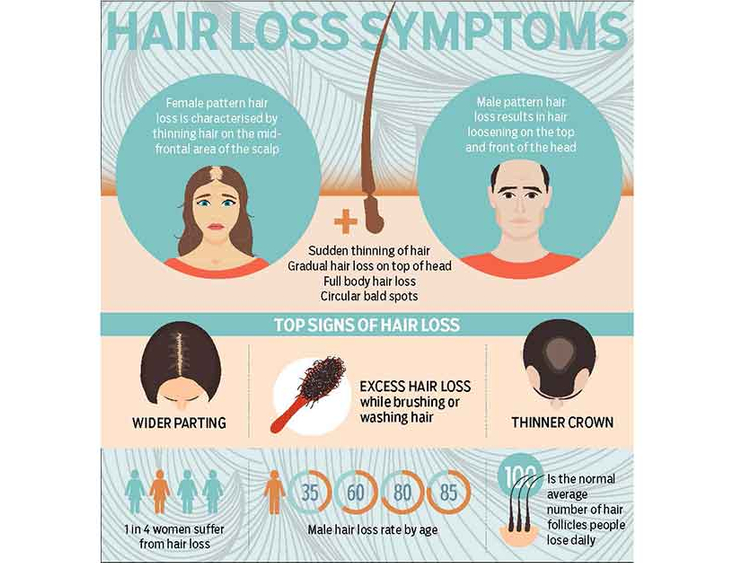The eyes might be the windows to the soul, but the hair has its own tales to tell. After all, split ends are a dead giveaway that you have over-processed hair, while hair loss could signal an undiagnosed medical condition.
It’s a common-enough complaint in the UAE, but when should you really worry? On average, a person loses between 50 and 100 strands of hair per day, and even up to 150 strands in some cases, says Dr Myrna Al Shareef, Dermatology Specialist at Mediclinic Al Sufouh. “Anything in excess of that should be addressed,” she tells GN Focus.
People of any age and ethnicity may see hair loss. While the condition could be isolated, it may also be associated with another disease or ailment, so anyone noticing changes should seek professional help. Doctors may seek to determine if your case is unusual with a simple hair pull test. “Fifty to sixty fibres are grasped close to the skin surface and tugged from the root of hair to tip,” says Dr Ravi Gutta, MD, Consultant — Allergy and Immunology, Mediclinic City Hospital. “The easy extraction of more than six hair fibres suggests the presence of active hair loss.”
Although men can naturally suffer hair loss, women also see their hair falling out. Female pattern hair loss is a common complaint in adult women and primarily involves the frontal scalp and vertex of the scalp, explains Dr Gutta. Untreated, it results in a slow, progressive decline in the hair density.
There are lots of different reasons why both genders may not pass the test. For women, internal causes include pregnancy, fever, weight loss, haemorrhage, surgery, psychological stress and certain medications. “Some systemic diseases and hormonal problems, such as thyroid and polycystic ovary syndrome, can also cause hair loss, ” says Dr Myrna.
For both genders, skin diseases that affect the scalp can also cause alopecia. These could be infections caused by fungus, bacteria or viruses.
External factors, such as how we treat our hair, are other causes. “Certain hair styling practices can affect the hair shaft as well as the hair bulb and can cause hair loss,” says Dr Myrna. “Hair dryer heat, excessive hair pulling and traction, relaxing chemicals and bleach can all damage the hair and/or the scalp and cause hair fall.”
Deficiencies caused by poor diet and lifestyle choices can also affect overall hair health. Mike Ryan, the UAE trichologist behind Dubaihairdoctor.com, says most hair problems he sees here are due to a lack of Vitamin D and low levels of Vitamin B12 and ferritin, a blood cell protein that contains iron.
A person’s genes also play a major role in hair thickness and hair shaft quality — as well as hair loss. Some men may even see hair loss in their twenties.
Ryan, however, says problems can be helped.
“We are experiencing excellent results in males with androgenetic hair loss by treating with platelet rich plasma and stem cell therapies. If diagnosed early enough, and at the early stages, we get some recovery. This is not a cure, but it slows the process and thickens the hair.”
The experts advise a healthy lifestyle if you want healthy hair. “Start by taking good care of yourself as a whole,” says Dr Myrna. She recommends a diet rich in omega 3 fatty acids, zinc, B complex vitamins, vitamin D and iron, or taking oral supplements of these vitamins and minerals if you feel your diet
is inadequate.
She also advises maintaining a healthy scalp: “Scaling, itching or redness of the scalp, as well as any bumps or lumps warrant a visit to the dermatologist.”
Some stylists recommend fixes such as shower filters to avoid hair and scalp problems, and eliminate unwanted elements in the water.
“Shower filters remove 98 per cent of chlorine and reduce water-soluble lead, mercury, nickel, chromium and other dissolved metals,” says Shakira Adams, Manager at Pastels Salon Mercato. “They will also help preserve hair treatments and colours.”












